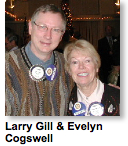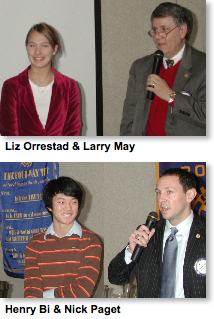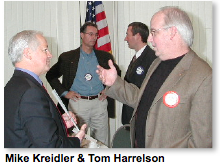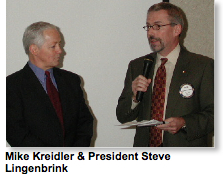 |
 |
|
|||||||||||||
Vol. 18, No. 24, DECEMBER 12, 2005: |
|||||||||||||||
How to Make Healthcare Work For Us | Last Call on Giving Tree | Friday Potpourri | Students of the Month: Liz Orrestad & Henry Bi | Salvation Army Needs Bell Ringers | Treasurer's Report | Holiday Social Tours Botanical Gardens | Golfing With the Elves | Holiday Meeting Schedule Posted | Exchange Student Visit | BBRC Attendance BIG at Rotary First Harvest | Nominations Close January 5 for District Governor Nominee | Web Fun
How to Make Healthcare Work for Us
The Commissioner began with some statistics: “98,000 Americans die each year in hospitals and 40 million have no health insurance. Using the standard insurance analogy, health insurance is really pre-paid health care. 600,000 people are not covered in Washington State. Healthcare costs are now rising annually in single digits (down from double-digits), but still three times greater than the rate of inflation. Starbucks pays $200 million in health care costs each year for their employees. That’s more than what they pay for beans.”
Phil reported that Sonic president Wally Walker was good on his promise of tickets to a future Sonics game. In fact, he made 4 tickets available. The tickets will go to a dad who made a request for tickets through the Giving Tree. What a great exercise is Salvatori’s Tree, and what a generous gesture from Wally Walker and the Sonics! One-hundred ten families will surely be blessed by the BBRC’s Giving Tree this year! President Lingenbrink opened the program telling members to have concern for new member Steve Bender’s wife who is undergoing surgery that day. Evelyn Cogswell gave the invocation and led the pledge to the Flag. Larry Gill orchestrated the greeting of several guests of members. Students-of-the-Month: Liz Orrestad & Henry Bi
Nick Paget introduced Henry Bi, a senior at Sammamish High School. Henry has an ambitious schedule: he is a member of the varsity football team, he has a 40-hour-a-week job, he pays his own way at school, and he maintains a perfect 4.0 grade point average. “I immigrated to the U.S. when I was 12. In my short time here, I’ve attended four high schools, in San Diego, Los Angeles, San Francisco, and Vancouver, BC, before coming to Bellevue. I’m a strong Christian and have hope and faith that God has a plan for me.” Henry is seeking admission to Boston University and the University of California among others. He plans a career in business.
Margie was disappointed to see that Dick Clarke was not present for the meeting. He was scheduled to do his last turn as Cashier prior to his retirement at the end of the month. Margie had a big celebration ready for him, including running a gauntlet of past treasurer’s and current cashiers. That effort being quashed, Margie did the next best thing: she traveled to Seattle and found Dick, which resulted in this email from our dear Past President and Past District Governor:
The four Bellevue Rotary Clubs jointly sponsor our Exchange student program. Please contact Mike Ralph with your contribution to involve Stefi in your family’s activities. BBRC Attendance BIG at Rotary First Harvest
Howard Johnson, RFH Coordinator reminded members about the RFH Christmas cards. Time’s rapidly evaporating on this project! Attending Saturday’s work party were Chuck Barnes, Robin Callan, Chip Erickson (with four other family members), Mitch Freedman (with three family members); Kevin Jewell (with one family member); Howard Johnson, Wayne McCaulley, Terry Peterson (with two family members); and Steve Waltar. Nice showing gang and it’s all for a great cause! Nominations Close January 5 for District Governor Nominee John Jacob Gardiner, PDG 2003-04, is sending out an official call for nominations for the office of District Governor, District 5030, for the Rotary year beginning July 1, 2008, through June 30, 2009. Applications should be sent to PDG Gardiner, no later than January 5, 2006. This call for nominations is coming earlier than it has in the past, in accordance with recent changes in the Rotary Manual of Procedure. It also gives future leaders more time to prepare for their positions. Please click here to read/print/download PDG Gardiner's letter to all BBRC Rotarians.
How to Make Healthcare Work for Us
The Commissioner began with some statistics: “98,000 Americans die each year in hospitals and 40 million have no health insurance. Using the standard insurance analogy, health insurance is really pre-paid health care. 600,000 people are not covered in Washington State. Healthcare costs are now rising annually in single digits (down from double-digits), but still three times greater than the rate of inflation. Starbucks pays $200 million in health care costs each year for their employees. That’s more than what they pay for beans.” So, how did we get in this mess? Kreidler said that our health insurance program is an employer-based system. “Back in WWII, employers would give health insurance in lieu of higher wages. That system stuck around. Our health care costs as a part of GDP is twice as expensive as other countries. This hurts U.S. competitiveness with other global competitors.” Kreidler sai,d “This hurts the whole U.S. economy. What changes can we make? Our present system is not currently sustainable.” The Commissioner said there are five principles he looks for when designing a health care program:
“It took years to get in this problem and will take some time to get out. There are some things the state can do which can influence the rest of the country. If companies will not be providing health insurance, then their surpluses need to come back to the consumer. One thing is sure, that current administrative health care costs are atrocious. The 12 top companies average 17% administrative costs. Add in the costs of health care providers this makes costs near 30%. Again, unsustainable.” Insurance for health care encompasses other coverages, for instance, insurance fraud, doctor’s liability insurance, and coverage for children.
Responding to a question on whether rationing of health care is on the horizon, Kreidler said, “Providers are in the middle of change. Rationing? We can’t call it that. Outcomes are more important.” How much does Medicare add to the mess? “Washington gives back more to the total national system because the Northwest has a healthier lifestyle. This has always been a contentious point, but we’ve never been able to attain equity with the rest of the nation.” When asked to be specific about insurance fraud, the Commissioner said he targets “organized crime, staged accidents, false billing, and fraudulent operations.”
Thanks to Chuck Kimbrough for his introduction. A certificate was give to Mike Kreidler for his presentation, indicating the BBRC has donated a book in his name to the King County Library Ready-to-Read program in support of Rotary International’s spearheading global literacy programs. Phil Salvatori writes: “This came to me from some Australian Rotary friends we met while vacationing. Marlene and her husband (both Rotarians) did a make-up at the BBRC while visiting us a few years ago. She sends a geriatric form of the alphabet that I thought all would enjoy." A is for Apple, and B is for Boat, Now A's for arthritis; B's the bad back, F is for fissures and fluid retention, J is for joints, out of socket, won't mend, N is neuralgia, in nerves way down low; Q is for queasy, is it fatal or flu? U is for urinary; big troubles with flow; Y is another year I'm left here behind, |
|||||||||||||||

 The BBRC’s famous Christmas Breakfast goes off this Friday morning at 7:00 a.m. Just to see the beautiful buffet breakfast provided for us by Glendale is worth the price of admission! Don’t miss this great event and watch our youngsters talk to Santa! If you haven’t let Sayoko know you’re coming, you should
The BBRC’s famous Christmas Breakfast goes off this Friday morning at 7:00 a.m. Just to see the beautiful buffet breakfast provided for us by Glendale is worth the price of admission! Don’t miss this great event and watch our youngsters talk to Santa! If you haven’t let Sayoko know you’re coming, you should  The Salvation Army is recruiting Bell Ringers for duty at Bellevue Square this coming Saturday, December 17. Sign-up sheets were made available by Captain Kelly Nolan. This is a Silent bell ringing exercise, but the payoff is great.
The Salvation Army is recruiting Bell Ringers for duty at Bellevue Square this coming Saturday, December 17. Sign-up sheets were made available by Captain Kelly Nolan. This is a Silent bell ringing exercise, but the payoff is great.  What had become a holiday tradition is scheduled again for Saturday, December 24, and die-hard BBRC golfers will gather at Mt. Si Golf Course for Golfing with the Elves!
What had become a holiday tradition is scheduled again for Saturday, December 24, and die-hard BBRC golfers will gather at Mt. Si Golf Course for Golfing with the Elves!  President Lingenbrink reminded members of our holiday schedule coming up. “Don’t show up on Friday, December 23rd, or Friday, December 30th, because we won’t be here! There are no meetings on these two dates to celebrate the Christmas holiday and New Years Day.
President Lingenbrink reminded members of our holiday schedule coming up. “Don’t show up on Friday, December 23rd, or Friday, December 30th, because we won’t be here! There are no meetings on these two dates to celebrate the Christmas holiday and New Years Day. 
 Mike Kreidler, Washington State Insurance Commissioner, laid out the current situations regarding health care in the state and the nation, and the story isn’t good. An Optometrist by training, Commissioner Kreidler has served as a U.S. Congressman and a state legislator. Mike is a former Rotarian in the Lacy club.
Mike Kreidler, Washington State Insurance Commissioner, laid out the current situations regarding health care in the state and the nation, and the story isn’t good. An Optometrist by training, Commissioner Kreidler has served as a U.S. Congressman and a state legislator. Mike is a former Rotarian in the Lacy club.  Giving Tree has found homes for all ornaments, according to Phil Salvatori. There are still a few gifts not yet delivered to Phil. Do that a soon as possible.
Giving Tree has found homes for all ornaments, according to Phil Salvatori. There are still a few gifts not yet delivered to Phil. Do that a soon as possible.  Friday Potpourri
Friday Potpourri
 Margie Burnett gave her year-end Treasurer’s report. “There’s money in the bank, and the bills have been paid!” (Cheer goes up from audience).
Margie Burnett gave her year-end Treasurer’s report. “There’s money in the bank, and the bills have been paid!” (Cheer goes up from audience).  Today (December 9th) is my 76th birthday. So, when the alarm went off at 5:45 a.m., I thought, "What the heck, I’ll sleep in and miss Rotary this morning; no one will miss me anyhow".
Today (December 9th) is my 76th birthday. So, when the alarm went off at 5:45 a.m., I thought, "What the heck, I’ll sleep in and miss Rotary this morning; no one will miss me anyhow". Mike Ralph introduced Stefania "Steffi" Rios Baltierra, our Rotary exchange student from Mexico, as a means of informing the club that January is the month when the BBRC will host Stefi in as many activities as we can schedule! Stefi, who speaks fine English, said she “loves being here. It’s beautiful, but really cold! I’m attending Bellevue High school and have enjoyed the snow in the mountains and competing in curling! I’m in the 11th grade and want to be a lawyer. I want to study in U.S.”
Mike Ralph introduced Stefania "Steffi" Rios Baltierra, our Rotary exchange student from Mexico, as a means of informing the club that January is the month when the BBRC will host Stefi in as many activities as we can schedule! Stefi, who speaks fine English, said she “loves being here. It’s beautiful, but really cold! I’m attending Bellevue High school and have enjoyed the snow in the mountains and competing in curling! I’m in the 11th grade and want to be a lawyer. I want to study in U.S.”  Nine Rotarians, supported by 10 family members, worked diligently in cold weather to process fresh food for needy families Saturday. Rotary First Harvest Work Party beckons Rotarians every second Saturday of the month.
Nine Rotarians, supported by 10 family members, worked diligently in cold weather to process fresh food for needy families Saturday. Rotary First Harvest Work Party beckons Rotarians every second Saturday of the month.  Mike Kreidler, Washington State Insurance Commissioner, laid out the current situations regarding health care in the state and the nation, and the story isn’t good. An Optometrist by training, Commissioner Kreidler has served as a U.S. Congressman and a state legislator. Mike is a former Rotarian in the Lacy club.
Mike Kreidler, Washington State Insurance Commissioner, laid out the current situations regarding health care in the state and the nation, and the story isn’t good. An Optometrist by training, Commissioner Kreidler has served as a U.S. Congressman and a state legislator. Mike is a former Rotarian in the Lacy club.  Some form of Universal Health Care is the answer. “I didn’t say what type of universal care. We should note that the much-talked-about Canadian system spends the same amount per capita as the U.S. That may not be sustainable. What I’m proposing is that every American should have coverage. If everyone isn’t covered, it comes back to all consumers.”
Some form of Universal Health Care is the answer. “I didn’t say what type of universal care. We should note that the much-talked-about Canadian system spends the same amount per capita as the U.S. That may not be sustainable. What I’m proposing is that every American should have coverage. If everyone isn’t covered, it comes back to all consumers.” In the question-and-answer session, a question was posed by Alex Rule about end care costs and the fact that people don’t take very good care of themselves. Kreidler replied that “people not making lifestyle changes are actually getting hammered pretty hard. We must change incentives for providers. We’ve got to eliminate the push for doctors to do volume, thus forgetting about quality care. The cost of medical technologies and pharmaceuticals are somewhat out of control, which only adds to the problem.”
In the question-and-answer session, a question was posed by Alex Rule about end care costs and the fact that people don’t take very good care of themselves. Kreidler replied that “people not making lifestyle changes are actually getting hammered pretty hard. We must change incentives for providers. We’ve got to eliminate the push for doctors to do volume, thus forgetting about quality care. The cost of medical technologies and pharmaceuticals are somewhat out of control, which only adds to the problem.” How do you get people to change behavior, thus reducing costs? Kreidler said that a public information program must be mounted to get consumers knowledgeable about what’s at stake and how we must solve the health care impasse.
How do you get people to change behavior, thus reducing costs? Kreidler said that a public information program must be mounted to get consumers knowledgeable about what’s at stake and how we must solve the health care impasse.